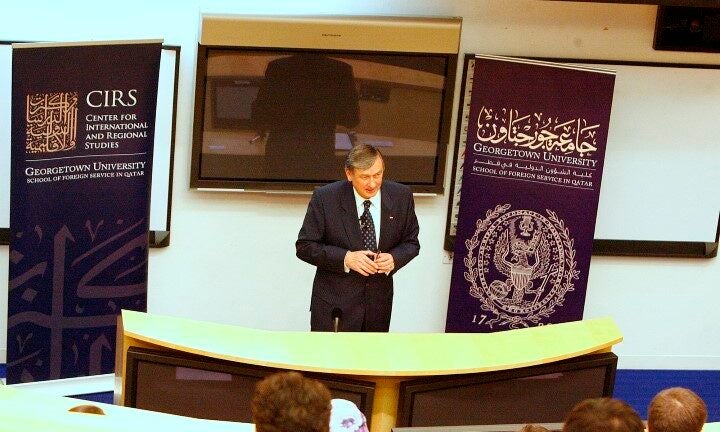American Studies, Dialogue Series, Distingushed Lectures, Regional Studies
President of Slovenia Offers Encouraging Words on State of Democracy

On January 10, the President of the Republic of Slovenia, Danilo Türk, spoke at Georgetown University School of Foreign Service in Qatar (SFS-Qatar). The lecture, hosted by the Center for International and Regional Studies (CIRS), drew students, staff and faculty from across Education City and focused on the state of democracy in our world.
President Türk began his discussion recalling his last visit to Qatar where he had met a group of students from SFS-Qatar and had been impressed with the interest they showed in issues concerning democracy. The president noted that although there is certainly much more that needs to be done to strengthen democracy on a global level, it is clear that much progress has been made in the past three decades, particularly in Europe. “Through this progress,” Türk stated, “the world has learned some important lessons.” First, Türk emphasized that democracy must come from within and cannot be imposed from abroad. However, he noted that democracy can and should be assisted internationally in a way that is respectful of international principles and standards, such as the Universal Declaration of Human Rights. In evaluating successful democratic transitions, Türk suggested that a democracy’s efficiency and legal quality should be examined. A democracy that does not adequately and efficiently address the electorate’s expectations poses a threat to the success of that process.
Furthermore, “democracy and rule of law go hand in hand and a democracy cannot flourish without respect for the rule of law,” added Türk.
Türk described human rights as part of the legal fabric of democracy. “Human rights will continue to represent the foundation of democracy,” he said. To this end, Türk asserted that human rights need to be ensured in all democracies albeit in way that is compatible with different political traditions and culture. Türk then recounted Indonesia’s successful democratic transition as an example of a process that worked for Indonesia since it came from within. “The model of Indonesia worked because it was Indonesian, and cannot be replicated exactly elsewhere,” stated Türk.
The president maintained that other parts of the world had to find their own solutions and that the process of democratization is ongoing, even in mature democracies. “Europe has seen democracy for quite some time, people think that it is irreversible but it is not,” he said. Türk called specific attention to the challenges many democratic European countries were now facing with regards to integrating immigrant communities, particularly those from Muslim countries. He then suggested two key guidelines to help facilitate this process. First, he said, one has to ensure that immigrant communities have access to education and employment. Second, according to Türk, immigrants must be ensured the opportunity for upward social mobility.
Although Türk acknowledged there have been setbacks and periods where democracy has suffered, he concluded on an optimistic note. Such setbacks, he said, “should not detract us from the progress that has been made. We now have to ask how to make democracy more effective and more prevalent in the world.”
Mehran Kamrava, interim dean at SFS-Qatar lauded President Türk’s insights and said, “our students are fortunate to have the opportunity to learn from a scholar on democracy and human rights who has engaged in diplomacy at the United Nations and ultimately became the political leader of his country. I hope that SFS-Qatar students are inspired to pursue their full potential.”